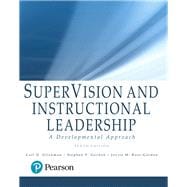Note: This is the bound book only and does not include access to the Enhanced Pearson eText. To order the Enhanced Pearson eText packaged with a bound book, use ISBN 0134290089.
The new edition of SuperVision and Instructional Leadership continues the innovative approach that has made it so widely popular, and includes a number of new content changes that bring the subject matter thoroughly up to date. Long recognized as a leading text in the field, this book calls for a collegial approach to instructional supervision; considers the knowledge necessary for successful supervision; discusses interpersonal skills, including different approaches to supervision and how they are used in developmental supervision; presents the technical skills of supervision, such as observing, assessing, planning, implementing, and evaluating; describes the technical tasks of supervision; and deals with the cultural tasks of supervision. A variety of learning aids ensure understanding of the theories and concepts. The Enhanced Pearson eText features embedded videos and chapter quizzes.
Improve mastery and retention with the Enhanced Pearson eText*
The Enhanced Pearson eText provides a rich, interactive learning environment designed to improve student mastery of content. The Enhanced Pearson eText is:
- Engaging. The new interactive, multimedia learning features were developed by the authors and other subject-matter experts to deepen and enrich the learning experience.
- Convenient. Enjoy instant online access from your computer or download the Pearson eText App to read on or offline on your iPad® and Android® tablet.*
- Affordable. Experience the advantages of the Enhanced Pearson eText along with all the benefits of print for 40% to 50% less than a print bound book.
*The Enhanced eText features are only available in the Pearson eText format. They are not available in third-party eTexts or downloads.
*The Pearson eText App is available on Google Play and in the App Store. It requires Android OS 3.1-4, a 7” or 10” tablet, or iPad iOS 5.0 or later.










